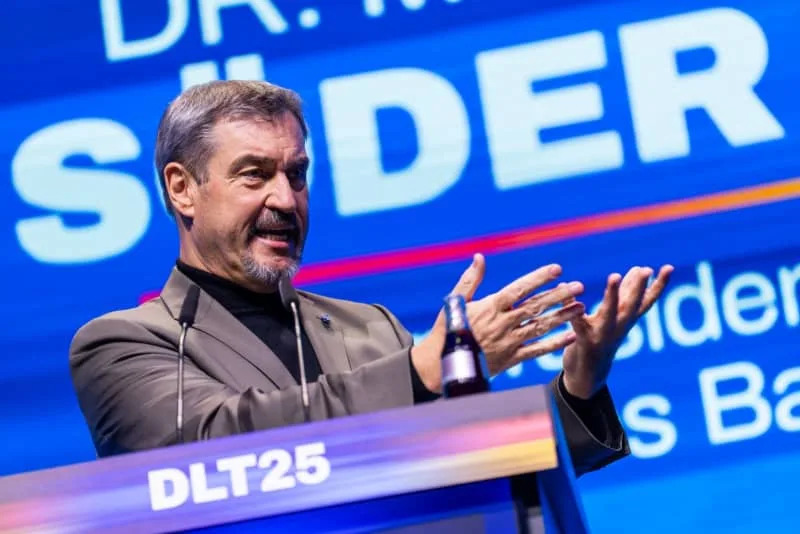World
Bavarian Premier Labels AfD Members as Putin’s ‘Court Jesters’

Bavarian Premier Markus Söder has sharply criticized the far-right Alternative for Germany (AfD), referring to its members as “Putin’s court jesters.” His remarks came during a conservative youth conference held in southwestern Germany on March 10, 2024. Söder’s comments highlight ongoing tensions between mainstream political parties and the rising influence of the AfD, particularly as the party has been accused of fostering closer ties with Russia.
Söder stated, “These people are sycophants, they are Putin’s court jesters, they are Kremlin servants.” He emphasized that AfD lawmakers have recently invited visitors to the Russian embassy in Berlin, a move he deemed troubling. This statement follows the announcement that several AfD politicians are set to visit Moscow, further intensifying scrutiny on the party’s stance regarding Russia.
As the leader of the Christian Social Union (CSU), Söder underscored the importance of his party, along with the Christian Democratic Union (CDU), in countering the AfD’s influence. “The only ones capable of keeping the radicals out of power are the CDU and CSU, no one else in the country,” he asserted, defending his party’s position against accusations of adopting similar rhetoric to that of right-wing populists.
Upcoming Challenges in State Elections
Looking ahead, Söder anticipates “big and tough battles” in the forthcoming state elections, particularly in eastern Germany, where the AfD has gained significant support. He echoed sentiments from Friedrich Merz, the leader of the CDU, by ruling out any potential cooperation with the AfD. “We have a different idea of freedom,” he stated, emphasizing that governance should not allow the judiciary and police to be controlled solely by the head of state, nor should it permit the oppression of minorities.
Söder further criticized the AfD, suggesting that the party includes “strange people,” many of whom are linked to right-wing extremism or are under legal scrutiny. His remarks reflect a broader concern within German politics regarding the normalization of far-right ideologies and the potential ramifications for democratic institutions.
The ongoing conflict between mainstream parties and the AfD marks a significant moment in German politics, as the country prepares for a series of pivotal elections. As public discourse continues to evolve, the strategies employed by parties like the CDU and CSU will be crucial in shaping the political landscape in the coming months.
-

 Science2 weeks ago
Science2 weeks agoUniversity of Hawaiʻi Joins $25.6M AI Project to Monitor Disasters
-

 Business3 weeks ago
Business3 weeks agoForeign Inflows into Japan Stocks Surge to ¥1.34 Trillion
-

 Top Stories3 weeks ago
Top Stories3 weeks agoMarc Buoniconti’s Legacy: 40 Years Later, Lives Transformed
-

 Top Stories3 weeks ago
Top Stories3 weeks agoBOYNEXTDOOR’s Jaehyun Faces Backlash Amid BTS-TWICE Controversy
-

 Health3 weeks ago
Health3 weeks agoInnovative Surgery Restores Confidence for Breast Cancer Patients
-

 Sports1 month ago
Sports1 month agoSteve Kerr Supports Jonathan Kuminga After Ejection in Preseason Game
-

 Science1 month ago
Science1 month agoChicago’s Viral ‘Rat Hole’ Likely Created by Squirrel, Study Reveals
-

 Lifestyle1 month ago
Lifestyle1 month agoKelsea Ballerini Launches ‘Burn the Baggage’ Candle with Ranger Station
-

 Entertainment1 month ago
Entertainment1 month agoZoe Saldana Advocates for James Cameron’s Avatar Documentary
-

 Top Stories3 weeks ago
Top Stories3 weeks agoCarson Wentz Out for Season After Shoulder Surgery: Urgent Update
-

 Politics1 month ago
Politics1 month agoDallin H. Oaks Assumes Leadership of Latter-day Saints Church
-

 Lifestyle1 month ago
Lifestyle1 month agoDua Lipa Celebrates Passing GCSE Spanish During World Tour









